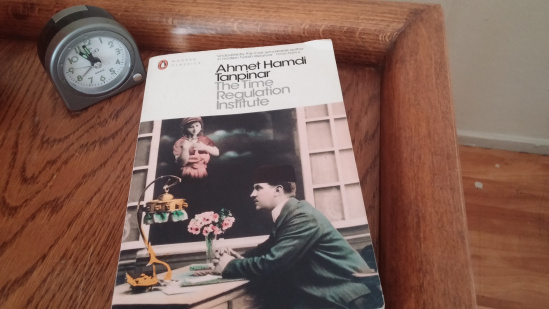“What time is it?” asks the Turkish rooster.
You recall last week the Internet buzz surrounding “Back to the Future” day – Oct. 21, 2015 – the day Marty McFly and Doc Brown famously arrived in the future. Now, that “future” was here, even in Turkey.
My students and I watched a video about “Things ‘Back to the Future’ Got Right,” (touch screens, wearable tech) and “Things ‘Back to the Future’ Got Wrong,” (most notably, flying cars). The video made for engaging discussion about technological progress, here in Turkey and around the world. You may say we had too much time on our hands; nevertheless …
With time on everyone’s minds, it came as a sort of surreal joke when, the following weekend, the clocks all over Turkey seemed to go berserk. It was Sunday morning, and my wife’s alarm clock went off. Actually she, not being a morning person, relies on two separate clocks – the one on her mobile phone, and the other being a standard non-digital clock.
Her mobile phone showed the time read 0700, while the standard clock showed 0800 – a one-hour difference. Which one was right? She opted to go with the one on her phone, and crawled back into bed for another hour’s blissful sleep.
Later, when she arrived at work, she discovered the time was 1000 – she was one hour late!
“Damn, I knew I should have listened to the standard clock,” she said later.
My wife wasn’t the only one thrown off, as I found out later on. Most people were late that morning. All over Istanbul, and throughout the country, people spent the rest of the day wondering what the hell time it was in their country.
###
So what had happened? It turns out that on Sunday, all of Europe’s clocks went back an hour. But in Turkey, the clocks had been kept at the regular time. Why? According to Turkish officials, the clocks had not been changed – as they normally would be to align with Europe – because of today’s elections.
You’re probably asking, as we did, what does turning the clocks back – or, in this case, not turning them back, have to do with elections? I’m still confused about it. My students said it had something to do (maybe) with the nation’s voting system, how the machines would be thrown off, or perhaps the idea was to allow voters one more hour of daylight to go to the polls.
That makes some kind of remote (Orwellian?) sense, I guess, although an observer could make wry comments about the difficulty of monitoring the nation’s apparently erratic pulse.
###
The whole episode brought me back to a book that’s been sitting on my shelf for months. “The Time Regulation Institute,” by Ahmet Hamdi Tanpinar, is a fictional memoir of one Hayri Irdal, who lives a very chaotic, discordant life in the time just after the fall of the Ottoman Empire and the beginning of the Turkish Republic.
The memoir also chronicles the rise and fall of The Time Regulation Institute, an absurd (fictional) organization whose job it was to keep all the nation’s watches on the Standard Time. If your watch was off this Standard Time, you had to pay a fine, and the institute had all these guys running around checking watches and collecting the fines. The institute even offered special promotions, such as a discount for every tenth time your watch was off! In this surreal atmosphere, people actually rushed, with a kind of coupon fever, to collect their discounts.
Beneath this satire, Tanpinar was commenting on the deep divide between East and West, and the difficulties Turkish society faced having to adjust to the post-Ottoman world. For anyone who wishes to have a better understanding of modern Turkey, and its relationship to Europe and the West, it’s essential reading. It’s a shame really that Tanpinar is not better known in the West, for his satire is as amusing and biting as Vonnegut.
My point, in bringing up the book, was that when the clocks went all askew the other day – and I found out that this had been a deliberate plan by the authorities – was that it seemed life was imitating art. The Time Regulation Institute was for real, folks!
But when you dig deeper, you stop and think: Who regulates time anyway? Why is it that every year, on such-and-such a day, all the clocks should go forward or back? What happens if a country decides not to go along with the program? (Actually, Saudi Arabia, for one, doesn’t go along with such changes — I know because I taught students there a couple of years ago, and when our clocks changed here in Turkey, theirs stayed the same. But for that matter, the Saudis don’t even follow the “normal” work week, having their weekends on Thursday and Friday to allow for going to the mosque on Fridays)
There could be certain tangible effects – in the business world, for example, there could be problems with logistics, deliveries, as well as pre-scheduled conference calls. But overall, the Internet, with its global reach, allows us to easily adjust, by simply checking online and making simple adjustments.
Anyway, the clocks here in Turkey will remain one hour back until after the elections, then they will be re-aligned with Europe.
###
Returning a moment to Tanpinar’s “Time Regulation Institute,” this whole clock controversy highlights again the strange position Turkey occupies in the world. Geographically, culturally, politically, it is both East and West. Historically, during Ottoman times, its orientation was decidedly East, but over the past century, with the modern Republic, it has more or less been aligned with the West (a member of NATO, and ever the EU bride in waiting).
Yet, there has been, and remains, something of a continental drift … the country vacillates, oscillates. This mind-set is at times conscious, while other times it is determined more by events. You could call it a case of permanently floating identity crisis: a predisposition that brews resentment, frustration, both here in Turkey and abroad, as foreign policy makers are constantly trying to figure out which way Turkey will swing on an issue, such as the current situation in Syria, or the fight against terrorism.
Or, as in this case, you’re simply trying to figure out the time (out of mind).
Yes, Marty: All this sounds, “pretty heavy.” But as Doc Brown concluded, weight’s got nothing to do with it.
###
James Tressler, a former Lost Coast resident, is the author of “Conversations in Prague,” “Lost Coast D.A.” and the recently published “City Scherzos: New Stories from Istanbul.” He lives in Istanbul.


CLICK TO MANAGE